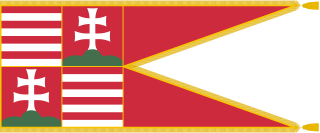 W
WIn the Late Middle Ages, the Kingdom of Hungary, a country in Central Europe, experienced a period of interregnum in the early 14th century. Royal power was restored under Charles I (1308–1342), a scion of the Capetian House of Anjou. Gold and silver mines opened in his reign produced about one third of the world's total production up until the 1490s. The kingdom reached the peak of its power under Louis the Great (1342–1382) who led military campaigns against Lithuania, southern Italy and other faraway territories.
 W
WThe Battle of Rozgony or Battle of Rozhanovce was fought between King Charles Robert of Hungary and the family of Palatine Amade Aba on 15 June 1312, on the Rozgony field. Chronicon Pictum described it as the "most cruel battle since the Mongol invasion of Europe". Despite many casualties on the King's side, his decisive victory brought an end to the Aba family's rule over the eastern Kingdom of Hungary, weakened his major domestic opponent Máté Csák III, and ultimately secured power for Charles Robert of Hungary.
 W
WThe Buda heresy was a Waldensian heretical movement from 1304 to 1307 in Buda, the capital of the Kingdom of Hungary. In a political context, the heresy was a tiny segment of a wider conflict during the era of Interregnum following the death of King Andrew III of Hungary, when various claimants fought for the Hungarian throne.
 W
WThe Battle of Capua was fought between 11–15 January 1348 between the troops of Louis I of Hungary and those of the Kingdom of Naples, in the course of the former's invasion of Naples.
 W
WStephen Dabiša was as a member of the Kotromanić dynasty who reigned as King of Bosnia from March 1391 until his death. Elected to succeed the first king, Tvrtko I, Dabiša at first maintained the integrity of the Kingdom of Bosnia. He successfully resisted Hungary, Naples, and even Ottoman Turks. The latter part of his reign, however, saw the ascent of magnates and considerable loss of Bosnia's territory and influence.
 W
WThe Neapolitan campaigns of Louis the Great, also called the Neapolitan Adventure, was a war between the Kingdom of Hungary, led by Louis the Great, and the Kingdom of Naples. It was fought from 1347 until 1352.
 W
WThe Privilege of Koszyce or Privilege of Kassa was a set of concessions made by Louis I of Hungary to the Polish szlachta (nobility) in 1374. The privileges were granted in Kassa, Kingdom of Hungary. In exchange, one of Louis' daughters was to ascend the throne of Poland after his death.